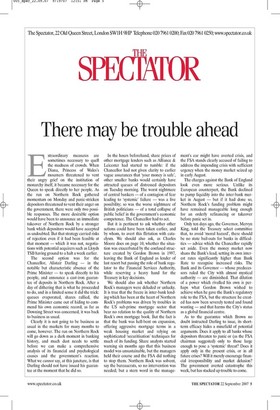There may be trouble ahead
Extraordinary measures are sometimes necessary to quell the madness of crowds. When Diana, Princess of Wales's mourners threatened to vent their angry grief on the institution of monarchy itself, it became necessary for the Queen to speak directly to her people. As the run on Northern Rock gathered momentum on Monday and panic-stricken depositors threatened to vent their anger on the government, there were only two possible responses. The more desirable option would have been to announce an immediate takeover of Northern Rock by a stronger bank which depositors would have accepted as undoubted. But that strategy carried risks of rejection even if it had been feasible at that moment — which it was not, negotiations with potential acquirers such as Lloyds TSB having ground to a halt a week earlier.
The second option was for the Chancellor, Alistair Darling — in the notable but characteristic absence of the Prime Minister — to speak directly to his people, and announce a cast-iron guarantee of deposits in Northern Rock. After a day of dithering that is what he proceeded to do, and in a limited sense it did the trick: queues evaporated, shares rallied, the Prime Minister came out of hiding to commend his own economic record; as far as Downing Street was concerned, it was back to business as usual.
Clearly it is not going to be business as usual in the markets for many months to come, however. The run on Northern Rock will go down as a dark moment in banking history, and much dust needs to settle before we can make a comprehensive analysis of its financial and psychological causes and the government's reaction. What we cannot say, at this juncture, is that Darling should not have issued his guarantee at the moment that he did so.
In the hours beforehand, share prices of other mortgage lenders such as Alliance & Leicester had started to tumble: if the Chancellor had not given clarity to earlier vague assurances that 'your money is safe', other smaller banks would certainly have attracted queues of distressed depositors on Tuesday morning. The worst nightmare of central bankers — of a contagion of fear leading to 'systemic' failure — was a live possibility; so was the worse nightmare of British politicians — of a total collapse of public belief in the government's economic competence. The Chancellor had to act.
But it is pertinent to ask whether other actions could have been taken earlier, and by whom, to avert this flirtation with cataclysm. We should also ask, as Charles Moore does on page 10, whether the situation was exacerbated by the confused structure created by Gordon Brown in 1997, leaving the Bank of England as lender of last resort but passing the role of bank regulator to the Financial Services Authority, while reserving a heavy hand for the Treasury in key decisions.
We should also ask whether Northern Rock's managers were deluded or unlucky. It is true that the freeze in inter-bank lending which has been at the heart of Northern Rock's problems was driven by troubles in the US sub-prime mortgage sector that bear no relation to the quality of Northern Rock's own mortgage book. But the fact is that the bank was hell-bent on expansion, offering aggressive mortgage terms in a weak housing market and relying on sophisticated `securitisation' techniques for much of its funding. Share analysts started warning six months ago that this business model was unsustainable, but the managers held their course and the FSA did nothing to stop them. Northern Rock was solvent, say the bureaucrats, so no intervention was needed; but a stern word in the management's ear might have averted crisis, and the FSA stands clearly accused of failing to address the impending crisis with sufficient urgency when the money market seized up in early August.
The charges against the Bank of England look even more serious. Unlike its European counterpart, the Bank declined to pump liquidity into the inter-bank market in August — but if it had done so, Northern Rock's funding problem might have remained manageable long enough for an orderly refinancing or takeover before panic set in.
Only ten days ago, the Governor, Mervyn King, told the Treasury select committee that, to avoid 'moral hazard', there should be no state bail-outs for banks in difficulties — advice which the Chancellor rapidly set aside. Even the money market now shuns the Bank's lead, setting its own interest rates significantly higher than Bank Rate to recognise increased risks. The Bank and its Governor — whose predecessors ruled the City with almost mystical authority — are diminished. That dilution of a power which rivalled his own is perhaps what Gordon Brown wished to achieve when he gave the Bank's regulatory role to the FSA, but the structure he created has now been severely tested and found wanting — and that harms the City's status as a global financial centre.
As to the guarantee which Brown no doubt instructed Darling to issue, its shortterm efficacy hides a minefield of potential arguments. Does it apply to all banks whose depositors threaten to panic or (as the FSA chairman suggested) only to those large enough to pose a 'systemic' threat? Does it apply only in the present crisis, or in all future crises? Will it merely encourage financial irresponsibility and market delusion? The government averted catastrophe this week, but has stacked up trouble to come.

































































 Previous page
Previous page